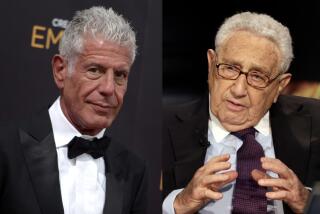Adam Bruno Ulam; Expert on Russia
Adam Bruno Ulam, one of the worldâs most respected experts on Russia and the Soviet Union who wrote 18 books, taught such students as Robert F. Kennedy and Henry Kissinger at Harvardâs Russian Research Center and advised several American presidents on foreign policy, has died. He was 77.
Ulam, who was on the Harvard faculty from 1947 until his retirement in 1992, died Tuesday in Cambridge, Mass., after a long illness, his family announced through university officials.
He was perhaps best known for his volumes examining the complex lives of two of communismâs most prominent leaders: âThe Bolsheviks,â considered a definitive treatment on Vladimir Lenin, who overturned the czars and seized power in Russia in 1917; and âStalin: The Man and His Era,â a 760-page biography of Josef Stalin published in 1973.
Many of Ulamâs books, updated with several editions, remain classic textbooks for students of Russia and of communism. Among them are âExpansion and Coexistence: Soviet Foreign Policy, 1917-1973â and his final book, âThe Communists,â published in 1992 after the disintegration of the Soviet Union.
Presidents, politicians and even the public joined students in reading Ulam.
His scholarly work âwas notable not only for the depth of his insights but also for the sparkling wit he displayed,â said Harvard colleague Mark Kramer, who was asked by the Ulam family to announce the scholarâs death. âAlthough the topics Ulam was analyzing were often grim and deadly, he was able to highlight the absurdities of Soviet life in a way that kept his books from being ponderous.â
Although nonfiction and analysis were his metier, Ulam also wrote one novel, again drawing on his expertise in all things Russian. âThe Kirov Affair,â published in 1988, imagines what really happened in the mysterious 1934 slaying of Bolshevik party leader Sergei Kirov, which touched off the Stalinist reign of terror. Although Stalin had many places and institutions, including the internationally famous Kirov Ballet, named in the slain manâs honor, the dictator himself was suspected of masterminding the murder.
Writing the novel in nine months, while he waited to see what would happen with Mikhail Gorbachevâs reformist policies, Ulam rated the book one of his most satisfying accomplishments.
The scholar was born April 8, 1922, in Lvov, a city then in Poland but now in Ukraine. In 1939 he left for the United States with his older brother, Stanislaw, only two weeks before Germany invaded. Stanislaw Ulam, who remained close to his younger brother until his death in 1984, became an eminent mathematician and physicist who played a major role in the development of the thermonuclear bomb.
The younger Ulam chose to study history and political science, earning his bachelorâs degree at Brown University and his doctorate at Harvard. He soon joined the Harvard faculty and became a naturalized U.S. citizen.
Ulam served as director of the Russian Research Center (renamed the Davis Center for Russian Studies in 1997) from 1973 to 1976 and from 1980 to 1992, and at his death held the title Gurney professor emeritus of history and political science.
His awards included Guggenheim and Rockefeller fellowships and in 1987 a lifetime achievement award from the American Assn. for the Advancement of Slavic Studies.
He is survived by two sons, Alexander and Joseph, and their mother, Mary Burgwin Ulam, from whom Ulam was divorced.
More to Read
Sign up for our Book Club newsletter
Get the latest news, events and more from the Los Angeles Times Book Club, and help us get L.A. reading and talking.
You may occasionally receive promotional content from the Los Angeles Times.








